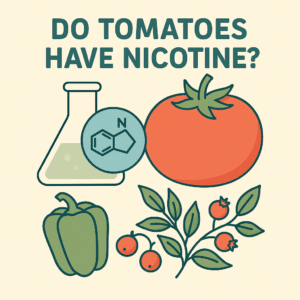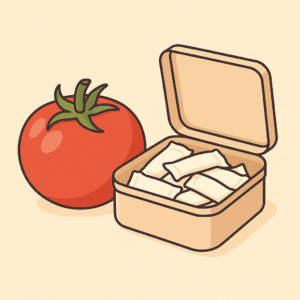Do Tomatoes Have Nicotine?
Introduction
In a world where tobacco use is steadily declining, with global prevalence dropping from 32.7% in 2000 to 22.3% in 2020 , it’s intriguing to discover that certain common foods, like tomatoes, contain trace amounts of nicotine. While these levels are minuscule compared to tobacco products, the presence of nicotine in tomatoes raises questions about its impact on our diet and health. In this article, we’ll delve into the science behind nicotine in tomatoes, compare it to other sources, and explore its significance in our daily consumption.
What Is Nicotine and Why Is It Found in Foods?
The Role of Nicotine in Plant Evolution
Nicotine isn’t just something we humans engineered to get a buzz—it’s actually a natural chemical that plants use to protect themselves. It’s part of a group of chemicals called alkaloids, and it’s toxic to insects. Over time, some plants evolved to include nicotine in their makeup as a sort of natural pesticide.
Why Certain Vegetables Contain Trace Nicotine
Some plants produce nicotine without even being closely related to tobacco. The main group responsible for this? The nightshade family (also known as Solanaceae). This plant family includes tomatoes, potatoes, eggplants, peppers, and even a few others you probably have in your kitchen right now. That’s how we ended up with nicotine in tomatoes.
The Nightshade Family Explained
The nightshade family includes several common vegetables, all of which share this weird little nicotine-producing trait. It doesn’t mean they’re dangerous—it just means they have teeny-tiny amounts of this compound. In fact, it’s so little that it’s almost biologically meaningless, but it’s still there!
Do Tomatoes Have Nicotine?
How Much Nicotine Is in a Tomato?
Great question. The tomatoes nicotine content varies depending on the type of tomato and its ripeness. On average, a medium-sized tomato (about 200g) contains around 1,400 micrograms (µg) of nicotine. That’s 1.4 milligrams—but it’s important to remember that this is spread across the whole tomato and is processed differently than inhaled nicotine.
Does Ripeness Affect Nicotine Levels?
Yes, it does. Unripe tomatoes generally contain more nicotine than ripe ones. As they mature and ripen, the nicotine levels naturally decline. So, if you love green tomatoes, you’re technically getting a slightly bigger nicotine kick (but still nothing close to a cigarette).
Tomato Products: Sauce, Ketchup, and Paste
Processing tomatoes into sauces or ketchup doesn’t remove the nicotine. In fact, it might concentrate it. Some studies show tomato sauce and ketchup contain 4,500 to 10,300 ng/kg of nicotine. So, that tomato pasta dinner? Still contains a little nicotine—but again, not enough to do anything noticeable to your body.
Nicotine in Tomatoes vs Nicotine Pouches
How Tomatoes Compare to Tobacco-Free Nicotine Alternatives
Let’s be real—if you’re using nicotine pouches like Zyn, Rogue or White Gold Nicotine Pouches, you’re getting a controlled and potent dose of nicotine. These pouches contain between 3 to 6 mg of nicotine each, which is thousands of times more than you’ll ever get from a tomato.
So while tomatoes do contain nicotine, they’re not even in the same ballpark as a nicotine pouch. If you’re trying to replace Zyn or Rogue with tomatoes—sorry, that’s not going to cut it.
Read our guide: Rogue Vs Zyn
Bioavailability: Digestion vs Absorption
Here’s something else to consider: how your body absorbs nicotine. When you eat a tomato, the nicotine passes through your digestive system, which is much slower and far less efficient than absorbing nicotine through your gums or lungs. That’s why you’ll never feel a “buzz” from a tomato, even if you eat 10 of them.
In contrast, nicotine pouches like Zyn are absorbed quickly through the mouth, delivering a fast and noticeable hit. So if you’re in it for the nicotine effect, tomatoes won’t compare.
Read our guide: Are Zyns Biodegradable
Nicotine in Tomatoes vs Cigarettes
Nicotine Quantity Comparison in mg and µg
Let’s look at raw numbers. A single cigarette contains around 10–20 mg of nicotine, whereas a medium tomato contains 1.4 mg—and that’s before your body fails to absorb most of it through digestion. You’d have to eat over 10 kg of tomatoes to even come close to the nicotine level in one cigarette.
That’s why any mention of nicotine in tomatoes vs cigarettes always comes with a giant disclaimer: not even close.
Can Tomatoes Produce a Nicotine “Buzz”?
Short answer: nope. The nicotine content is too low, and the way it’s absorbed is too slow. You could eat a truckload of tomatoes and still not get the same effect as lighting up. So even though we can say, “yes, there is nicotine in tomatoes,” there’s no need to panic, you won’t be able to geta nicotine buzz through food. Your Caprese salad won’t get you hooked.
Health Implications of Nicotine in Tomatoes
Should You Worry About Nicotine in Your Diet?
Not at all. In fact, some studies suggest that nicotine in vegetables might have neuroprotective properties. There’s ongoing research exploring whether consuming nightshade vegetables (like tomatoes and peppers) might reduce the risk of diseases like Parkinson’s—though it’s not conclusive.
So if you’ve been wondering, does tomatoes have nicotine? Yes. But should you care? Not really.
Can Tomatoes Influence Drug Tests or Cravings?
This one’s a fair concern. Could eating tomatoes result in a false positive on a nicotine drug test? Fortunately, no. The nicotine levels in these foods are way too low to trigger any alarms. You can eat tomatoes without messing up your Zyn Rewards status, your medical tests, or your cravings.
Other Fruits That Have Nicotine
Are Tomatoes the Only Nicotine-Containing Fruit?
Actually, yes—sort of. Tomatoes are a fruit by botanical standards, and they’re one of the few fruits known to contain nicotine. Most common fruits like apples, bananas, and berries don’t contain any detectable nicotine.
What About Berries, Bananas, and Apples?
Nope. These fruits are nicotine-free. So if you’re trying to avoid even trace amounts of nicotine in your diet for whatever reason, stick to non-nightshade fruits and vegetables.
Cooking and Nicotine: Does It Change Anything?
Does Cooking Tomatoes Reduce Nicotine Content?
Surprisingly, cooking doesn’t do much to reduce the nicotine content. In fact, some methods like frying or roasting might concentrate it, since you’re reducing water content. Still, even “concentrated” tomatoes contain very little nicotine in the grand scheme.
Are Processed Tomato Products Higher in Nicotine?
A bit, yes. Tomato sauce, paste, and ketchup can contain slightly higher levels of nicotine per gram than raw tomatoes. But even then, it’s nowhere near enough to have a measurable effect. So enjoy your ketchup. Just don’t expect it to replace your stash of Zyn Flavors anytime soon.
Conclusion
After diving deep into the science and comparisons, here’s the bottom line: yes, tomatoes do have nicotine, but the amount is so minimal that it has no measurable impact on your health or behavior. The nicotine in tomatoes is a natural byproduct of their place in the nightshade family—not something added or harmful.
When compared to products like nicotine pouches, Zyn flavors, or even a single cigarette, the nicotine in tomatoes vs cigarettes is laughably small. You’d need to eat kilograms of tomatoes to get even close to the nicotine in a single pouch or smoke.
So, if you were worried or surprised by the idea that tomatoes have nicotine—don’t be. Keep enjoying your salsa, ketchup, and pasta sauce. They’re still incredibly healthy and packed with nutrients like lycopene, vitamin C, and potassium.
Just remember: if you’re looking for a nicotine fix, stick to purpose-made alternatives like Zyn or Rogue Nicotine Pouches—not a caprese salad. And no, adding a tomato to your lunch won’t boost your Zyn Rewards or impact your reading on Ozempic either.
In short: how much nicotine in tomatoes? A tiny trace. Should you care? Not unless you’re planning to smoke your spaghetti.






